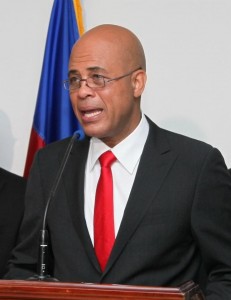“The current governance of the country has nothing to do with democracy,” declared Evans Paul, leader of United Democratic Convention KID (French acronym), intervening live on Invite du Jour. “The country faces an autocracy in which the closest advisors of the head of state dares not provide him any council,” added Paul on Radio Vision 2000’s popular weekday talk show where decorated journalists Valery Numa and Marie Lucie Bonhomme discuss current events with prominent political leaders. Assessing the state of the Nation, the former presidential candidate criticized the Martelly administration he said, since assuming office on May 14, 2011, weakened state institutions and provoked political degradation.
Martelly, whose right shoulder surgery at a Miami hospital early last month prevented his attending Colombia’s sixth Summit of the Americas, rushed back to Miami nearly three weeks ago, suffering from pulmonary embolism. His sudden return to the hospital puzzled many leaders, including Paul who expressed serious concerns over the country’s lack of leadership, absent a legitimate government. Equally alarmed, senate President Simon Desras echoed Paul’s concerns speaking with the Miami Herald. “No one knows in which hospital the president is, what he suffers from,” admitted Desras whose immediate resolution involved flying a delegation to Martelly’s hospital. “There is a void,” added the National Assembly’s president, “No one knows who is running the country.”
However, the president maintained, in two pre-recorded video played on state television a week apart, while doctors discovered a blood clot in his lungs, he had a direct line of communication with his cabinet. During his first appearance since the incident, Martelly detailed his brush with death to Haitian radio host Alex Saint-Surin. “I couldn’t breathe, I couldn’t talk, I couldn’t eat, I couldn’t stand, I couldn’t lay down, I couldn’t do anything,” recounted the head of state during Radio Mega’s North Miami Beach’s live broadcast. “My stomach was compressed,” he added, “It felt as if three people were pressing down on it.”
As the president focused on his recovery, sporadic violent incidents sprung around the Haitian capital, heightening a sense of insecurity. Rogues forces claiming ex-soldiers status, stormed the House of Deputies and disrupted the ratification process of designated Prime Minister Laurent Lamothe. The heavily armed men demanded acknowledgment from lawmakers in their quests for restitution and to reconstitute the Armed Forces of Haiti. President Martelly condemned the gunmen who wore military uniform and, some of which carried hand grenades; nevertheless, they challenged government authority, chanted slogans and called on lawmakers to restore the army disbanded in 1995 by former President Jean Bertrand Aristide. Many leaders, including House President Levaillant Louis-Jeune, denounced the paramilitary’s disruption as a threat to state institutions: hence democracy itself.

Haitian President Michel Martelly
Following that incident, police officers overlooking judicial apparatus to avenge their colleague Walky Calixte’s death, attempted the unwarranted arrest of deputy Rodriguez Sejour they alleged murdered their brethren. Anger flared following a crime spree that, within 24 hours, left three members of the Haitian National Police dead. As a result, officers went on strike and barricaded major highways in protest. Deputy Sejour immediately issued a statement, rejecting the allegations officers made against him. Even more alarming, the entire Justice Department also went on strike with its own list of demands, hoping to pressure the executive branch to finally install Haiti’s highest Court, as the Haitian Constitution required. President Martelly, who recently filled four remaining vacancies on the Court, postponed their swearing-in ceremony indefinitely. As lawyers and judges urged immediate actions from the administration, they threatened to stop working until the government takes appropriate actions. The U.S. embassy in Haiti even issued warnings to its citizens, citing sporadic incidents of civil unrest occurring in various locations of Port-au-Prince, reported the Miami Herald.
On Invite du Jour, Paul attributed the leadership void to Martelly’s inexperience in the political realm. “The current crises are the result of total ignorance of the head of state in politics,” he said. “Many observers questioned the ability of President Michel Martelly to govern the country, due to his lax approach to important state matters,” he added. For Minister of Economy and Finance Andre Georges Lemercier however, the reality vastly differed from Paul’s depiction. “The government is not dysfunctional in the absence of President Michel Martelly,” he assured Radio Vision 2000 reporters. “Besides,” he added, “Almost all Departments are hard at work.” Reinforcing Martelly’s message to the nation, Lemercier told journalists, “Now the government is healthy.”